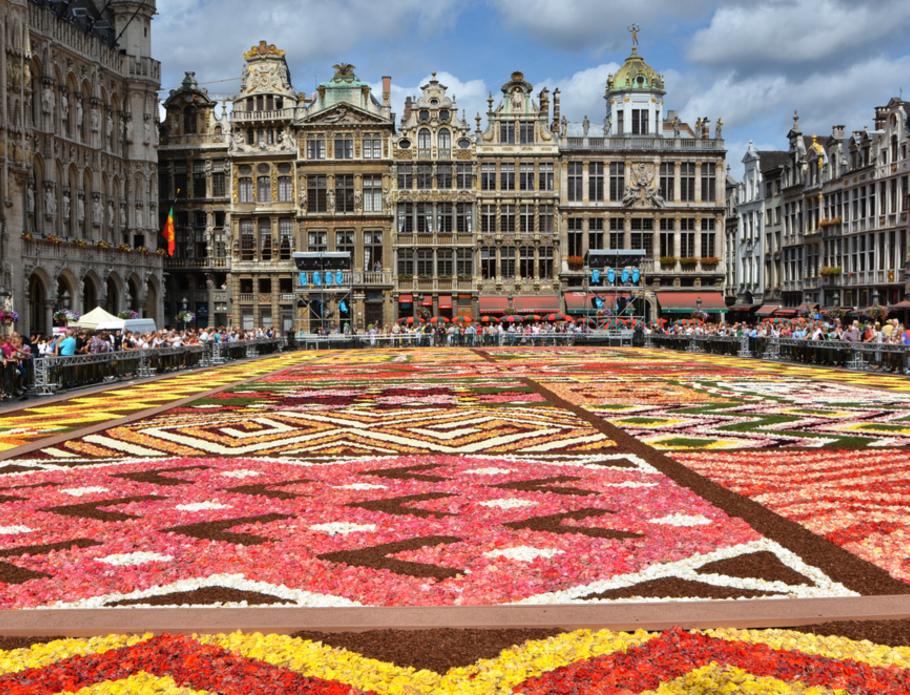
OVERVIEW-Growth opportunities in Belgium’s halal food industry
Photo: Brussels Flower Carpet, August, 2012, Brussels, Belgium / Semyonov / Shutterstock.com
Belgium’s halal food industry is estimated at $1.8 billion in 2015, and it primarily addresses the core dietary needs of the country’s close to 680,000 Muslims. With a robust halal ecosystem and demand underpinned by strong population growth, what opportunities are there for new players to enter Belgium’s halal food industry?
| YOUR PAIN POINTS ADDRESSED | ASK YOURSELF | |
| Scenario: You are a medium-sized food manufacturer operating in Belgium seeking to address Muslim demand. How attractive is the opportunity? |
How robust is Belgium's halal food market? |
What is the broader market context for Belgium's halal food industry? |
| What is driving the demand for halal food produced in Belgium and who is addressing this demand? | ||
| What are some key considerations for companies seeking to address this market opportunity? | ||
BELGIUM’S FOOD AND BEVERAGE MARKET
Belgium’s location in Western Europe makes it a centre for logistics in the European Union, according to FEVIA, the Federation of the Food and Drink Industry in Belgium. The industry body also reports that food products in Belgium are considered high quality, which encourages international exports and further growth for the food sector. The country's food sector growth can be attributed to the tremendous export value and global demand around the world.

| BELGIUM FOOD & BEVERAGE INDUSTRY VITAL STATS | ||
| AGRICULTURE and F&B | MEAT and POULTRY | COMPANIES AND EMPLOYMENT |
|
$3 billion: Agriculture industry value, equivalent to 0.6 percent of the country’s $494.1 billion GDP 48.1 million euros ($54.1 million): F&B industry turnover $38.3 billion in food-related exports |
860,000 tons: Annual pork exports (7th largest exporter of pork in the world) 140,000 tons: Annual exports of beef and veal (Cattle slaughtered up from 460,000 in 2005 to 505,000 in 2014) POULTRY: Production dropped from 44.7 million heads in 2004 to 42.5 million in 2014 (Source: Belgian Meat Office) $3.9 billion: Exports of meat and live animals $2.1 billion: Imports of meat and live animals $1.8 billion: Trade surplus for meat and live animals (Source: International Trade Centre data) |
4,425 companies that employ over 88,000 staff 83.4 percent are SMEs that employ less than 20 staff each 168 companies employ over 100 staff Two of Belgium’s largest meat producers include Westvlees and Covalis, which operate slaughterhouses and merged in 2015 |
HALAL MARKET OPPORTUNITY AND ECOSYSTEM
In 2010, 5.9 percent, or 630,000, of Belgium’s total population was Muslim. Applying the same percentage to 2015 translates to an estimated 673,000 Muslims.
Muslims in Belgium were estimated to have spent $2.17 billion on food and beverage in 2015, up from $2.13 billion in 2014. This is expected to reach $2.46 billion in 2021, based on 2.1 percent CAGR, according to the State of the Global Islamic Economy 2016/17 report (pdf).
There are more than 100 halal food restaurants, markets, and retail outlets in Belgium; Zabihah.com lists at least 116.
The country’s halal food industry was estimated at 1.7 billion euros ($1.8 billion) in 2013, according to a study by the Belgian Ministry of Agriculture and Fishery. Assuming annualized growth in line with Muslim spend from 2014 to 2015 would imply a $1.9 billion industry in 2015, including food exports to Organisation of Islamic Cooperation (OIC) markets.
Certification
There is a robust ecosystem to support Belgium’s halal food industry. that support its ecosystem and have been accredited and recognized by Indonesia’s halal certifier the Majlis Ulama Indonesia (MUI). These include the Halal Food Council of Europe (HFCE), and EuroHalal’s Office of Control and Halal Certification.
The most notable halal certifier registered in Belgium is the Halal Food Council of Europe (HFCE), which was established in 2010. HFCE’s primary objectives include promoting the concept of halal food products, making them available, introducing them to existing industry players, and providing solutions to Muslim consumer needs. HFCE is recognized by notable organizations including Islamic Food and Nutrition Council of North America (IFANCA), Majlis Ulema Indonesia (MUI), Department of Islamic Development Malaysia (JAKIM), and Majilis Ugama Islam Singapura (MUIS). HFCE is also hosting the 7th International Halal Food Conference that is co-sponsored by IFANCA in 2016. Natural food ingredients supplier Kanegrade and poultry retailer Volys Star are examples of companies with products certified by HFCE.
KEY CONSIDERATIONS
To ensure success for food companies in Belgium’s halal food industry, it is important to get certified by a well-recognized body.
Although Belgium primarily exports meat and live animals to its European neighbours, it also exported $61.7 million to OIC countries in 2015. The largest OIC importers of meat and live animals from Belgium include Gabon and Benin, which imported $7 million and $6.9 million of meat and live animals in 2015 respectively.
There is opportunity for halal food companies to market products to the broader market to include non-Muslims in addition to Muslims. However, there has been negative backlash from parts of the Belgian community regarding halal-certified products.
Most recently, last year established Belgian company Siroperie Meurens, founded in 1902, received negative comments via its website and phone calls after having its signature fruit syrup halal-certified. Protests also erupted outside the company’s factory.
| SUGGESTED ROADMAP |
| Get certified by a well-recognized body: Broaden access to OIC markets, where the core opportunity lies |
| Reach a broader set of consumers at home: Focus on product quality, not just halal, to take a notable share in the global F&B market opportunity |
© SalaamGateway.com 2016 All rights reserved

Yasir Malik, DinarStandard